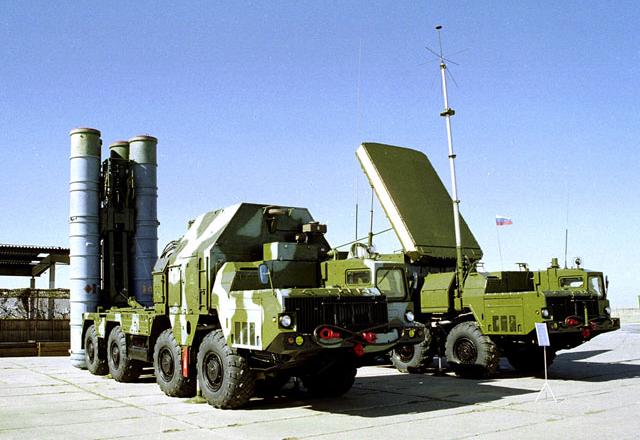You are here
Russia lifts ban on delivery of S-300 missiles to Iran
By AP - Apr 13,2015 - Last updated at Apr 13,2015
MOSCOW — President Vladimir Putin on Monday opened the way for Russia's delivery of a sophisticated air defence missile system to Iran, a move that would significantly bolster the Islamic republic's military capability.
The decision was quickly welcomed by Tehran, while it worried Israel, which saw it as a sign that Iran already had begun to cash in on the nuclear deal with world powers that is expected to be finalised by the end of June.
Russia signed the $800 million contract to sell Iran the S-300 missile system in 2007, but suspended their delivery three years later because of strong objections from the United States and Israel. Putin on Monday lifted that ban.
The preliminary agreement on settling the Iranian nuclear standoff reached earlier this month made the 2010 Russian ban unnecessary, Russian Foreign Minister Sergey Lavrov said in a televised statement.
"The S-300 is exclusively a defensive weapon, which can't serve offensive purposes and will not jeopardise the security of any country, including, of course, Israel," he said.
Lavrov spoke with US Secretary of State John Kerry over the phone Monday to discuss Iran-related issues, the situation in Syria, Yemen and other matters, the Foreign Ministry said.
The deal reached by Iran and six world powers is intended to significantly restrict its ability to produce nuclear weapons while giving it relief from international sanctions. The agreement is supposed to be finalised by June 30, and there is no firm agreement yet on how or when to lift the international sanctions on Iran.
The S-300 missile system, which has a range of up to 200 kilometres and the capability to track down and strike multiple targets simultaneously, is one of the most potent air defence weapons in the world. If deployed in big numbers, the system could provide a strong deterrent against any air attack.
If Israel decides to attack Iran's nuclear facilities, the S-300s would further complicate the already daunting task.
Israeli Cabinet minister Yuval Steinitz said the framework nuclear agreement helped legitimise Iran and cleared the way for Monday's announcement by Russia.
Israel has harshly criticised the US-led nuclear deal, saying it would give Iran relief from sanctions while leaving its nuclear programme largely intact. Israel believes Iran still intends to develop a nuclear weapon.
"This is a direct result of the legitimacy that Iran obtained from the emerging nuclear deal," Steinitz said. He added that the arms deal shows that Iran plans to use the relief from economic sanctions to buy arms, not improve the living conditions of its people.
"Instead of demanding Iran stop its terror activities that it spreads in the Middle East and the entire world, it is being allowed to arm itself with advanced weapons that will only increase its aggression," Steinitz said.
Lavrov didn't say when Moscow could deliver the missiles. Russian officials previously said that the specific model of the S-300 that Russia was to deliver under the 2007 contract is no longer produced, and offered Iran a modified version of it called S-300VM, or Antey-2500.
In Tehran, Gen. Reza Talaeinik said the decision by Russia on delivery of the air defence system will help improve ties between Tehran and Moscow, the semi-official Tasnim news agency, which is close to Iran's military, reported.
"With no doubt, this will boost ties and interactions between Iran and Russia," said Talaeinik. "When ties are based on mutual respect and observing rights, the ground will be paved for cooperation in other fields, too."
Back in 2010, Russia linked its decision to freeze the missiles' delivery to the sanctions the United Nations Security Council imposed on Iran over its nuclear programme, but Lavrov argued Monday that the Russian move was voluntary and not directly required by the UN resolutions.
"It was done in the spirit of good will in order to encourage progress in talks," Lavrov said. "We are convinced that at this stage there is no longer need for such an embargo, specifically for a separate, voluntary Russian embargo."
Iran responded to the Russian ban by filing a lawsuit with a court in Geneva seeking $4 billion in damages for breach of contract, but the court has not issued a ruling.
Lavrov said that Russia had to take into account "commercial and reputational" issues linked to freezing the contract.
"Because of the suspension of the contract, Russia has failed to receive significant funds," he said. "We see no need to continue doing that."
He added that Iran badly needs modern air defence systems because of a tense situation in the region, specifically in Yemen.
Related Articles
Russian President Vladimir Putin said on Thursday Iran's drive to find a solution in talks over its disputed nuclear programme had spurred his decision to renew a contract to deliver S-300 missile defence systems to Tehran.
Russia's decision to supply Iran with the S-300 missile air defence system was seen by critics in Israel and the United States as proof this month's framework nuclear agreement was already making Tehran more of a threat.
Russia has offered Iran advanced surface-to-air missiles after scrapping a similar deal in 2010 because of UN sanctions over Tehran's nuclear programme, the state defence company said Monday.














